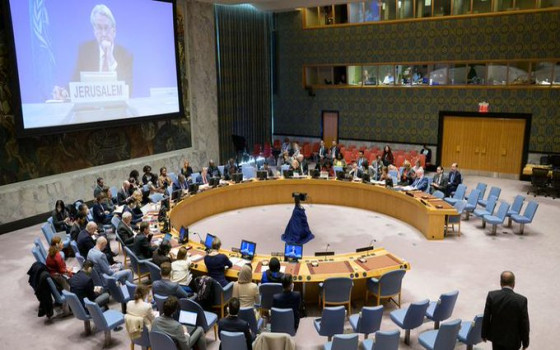
United Nations: On the International Day of Conscience: We must promote a culture of peace with love and conscience

- Europe and Arabs
- Wednesday , 5 April 2023 14:28 PM GMT
Brussels: Europe and the Arabs
The United Nations News Bulletin website said in a tweet today, Wednesday, on Twitter, that the fifth day of April is the International Day of Conscience. And the goal of what the general public aspires to is the emergence of a world in which the individual enjoys freedom of speech and belief and is freed from fear and hypocrisy.” In addition, the first article of the Declaration stated explicitly the fact: “All people are born free and equal in dignity and rights. They are They are endowed with reason and conscience and should act towards one another in a spirit of brotherhood.”
The attention of the United Nations remains focused on saving future generations from the scourge of war, which calls for a shift towards a culture of peace consisting of values, attitudes and behaviors that reflect and inspire social interaction and solidarity on the basis of the principles of freedom, justice, democracy, all human rights, tolerance, solidarity and renunciation of violence, as it seeks to Preventing the outbreak of conflicts by addressing their root causes, solving problems through dialogue and negotiation, and guaranteeing these generations the full exercise of all rights, and the means of full participation in the development process of their societies.
Aware of the need to create conditions of stability and well-being and to establish peaceful and friendly relations based on respect for human rights and fundamental freedoms for all without distinction as to race, sex, language or religion, in its resolution 73/329 proclaimed 5 April as the International Day for conscience
The General Assembly called on all Member States, organizations of the United Nations system and other international and regional organizations, as well as the private sector and civil society, including non-governmental organizations and individuals, to build a culture of peace with love and conscience in accordance with the prevailing culture and other circumstances or norms in their local, national and regional societies, including by providing quality education and carrying out public awareness activities, thus promoting sustainable development.
Origin of the concept of a culture of peace
The concept of a culture of peace emerged from the International Conference on Peace in Human Minds, which UNESCO joined in Côte d'Ivoire in July 1989. The promotion of a culture of peace was increasingly seen as a worthy goal for the international community to pursue. From the concept that crystallized, activities on many levels and in many regions were inspired with the full participation of civil society so that the culture of peace gradually acquired the characteristics of a global movement.
The concept of a “peace initiative” within the United Nations system goes back to the founding charter of the United Nations Educational, Scientific and Cultural Organization (UNESCO), which was adopted more than fifty years ago, in which the organization was called upon to build defenses for peace in the minds of people because “peace that is based on arrangements Political and economic on the part of governments alone, it will not be a peace that would enjoy the unanimous and permanent support of the people of the world, and in order for peace not to fail, it must be based on the intellectual and moral solidarity of humanity.”
Building a culture of peace
Building a culture of peace requires comprehensive educational, educational, social and civil work, through which every person is allowed to learn, give and share. It addresses all ages and all groups; It is also an open-minded global strategy with a specific goal, which is to make the culture of peace inseparable from the culture itself, while embedding it in people's hearts and minds. Peace is not only the absence of differences or conflicts, but rather a positive, dynamic and participatory process inextricably linked to the achievement of democracy, justice and development for all, in a way that ensures respect for differences, encourages dialogue and transforms conflicts continuously by separating non-violence means into new ways of cooperation.
Based on this broader and more positive meaning of peace, the culture of peace becomes a set of values, attitudes, traditions, customs, patterns of behavior and ways of life so that they embody in their totality an expression of, and an aspiration to respect life and respect for human beings and human rights, while rejecting violence in all its forms, and recognizing the equal rights of men and women, Recognition of the right of every individual to freedom of expression, expression of opinion and access to information, adherence to the principles of democracy, freedom, justice and development for all, tolerance, solidarity, pluralism, acceptance of differences and understanding between nations, and between ethnic, religious, cultural and other groups and between individuals.
The United Nations and the Culture of Peace
It is known the importance of the role played by the United Nations Educational, Scientific and Cultural Organization and the work of the United Nations Alliance of Civilizations in the field of dialogue between cultures, along with their activities related to the culture of peace and non-violence, and their efforts to promote a culture of peace through many practical projects in the areas related to youth and education, media and migration, in collaboration with governments, international organizations, foundations and civil society groups, as well as the media and the private sector.












No Comments Found